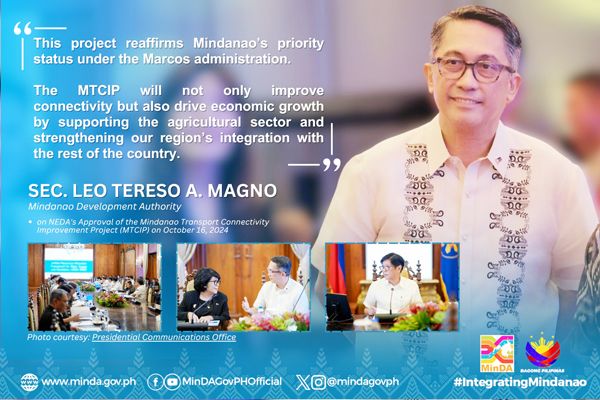DAVAO CITY – Mindanao Development Authority (MinDA) Chairman Secretary Leo Tereso A. Magno welcomed on Thursday, October 17, the Mindanao Transport Connectivity Improvement Project, and emphasized his trust in the administration’s strong commitment to Mindanao’s growth.
Magno made the statement after the National Economic and Development Authority (NEDA) Board, led by President Ferdinand Marcos Jr., recently approved the MTCIP, marking the crucial step in advancing infrastructure and economic growth in Mindanao.

He said the project reinforces Mindanao’s priority under the Marcos administration. Through improved connectivity, the MinDA chair believes that the project would foster economic growth by enhancing the agricultural sector and the region’s integration with the rest of the country.
During the 21st NEDA board meeting in Malacañang, Marcos underscored the MTCIP’s importance as a key infrastructure project among the administration’s primary road programs for Mindanao.
“I think we should proceed with the project as much as possible. The project is seen as a critical part of the administration’s efforts to bring Mindanao closer to the national economic center and ensure that it becomes an integral part of the country’s development,” Marcos said.
The MTCIP, headed by the Department of Public Works and Highways and funded by the World Bank, seeks to upgrade and expand the region’s transportation network, focusing on supporting agricultural areas.
It is part of the DPWH’s master plan for the High-Standard Highway Network Development Project, which aims to interconnect critical regions in the country, including Northern Luzon, Central Luzon, Visayas, and Mindanao.
DPWH Secretary Manuel Bonoan highlighted the project’s potential, saying that it will offer high-quality traffic services to ensure safe and efficient travel, promoting socio-economic growth in Mindanao.
Bonoan said the project aims to improve existing roads and build new ones to connect Northern Mindanao, Davao region, South Cotabato, Cotabato, Sultan Kudarat, Sarangani, and General Santos City (Soccsksargen).
The MTCIP would also improve the transport of agricultural products, particularly from remote areas, lower road maintenance expenses, and maintain the long-term value of current road infrastructure.
Set for completion by 2030, the MTCIP promises to be a game changer for Mindanao’s transport infrastructure, paving the way for further rural road development beyond 2030, DPWH officials said.
The government said stakeholders hope the project will help unlock the region’s full economic potential, benefiting industries like agriculture while contributing to national growth.